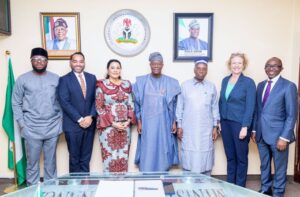

Businesses must embrace ESG to secure Nigeria’s future – PWR Advisory CEO
By Esther Agbo
At the concluding part of the 2024 Annual Directors Conference held on the 31st of October, at Eko hotels and suites, the CEO of PWR Advisory, Ms. Ivie Ivana Osagie underscored the urgency for Nigerian businesses to adopt Environmental, Social, and Governance (ESG) principles.
Emphasising the critical role of companies in shaping sustainable development, Osagie challenged attendees to rethink their corporate strategies and prioritise long-term value over short-term gains.
“Businesses cannot thrive in societies that fail,” Osagie declared, urging Nigerian business leaders to consider their broader impact on society. “Contrary to some beliefs, ESG is not just a cost centre, and it’s more than a compliance machine. It is an investment with direct financial returns.”
“ESG is a strategic catalyst for growth and long-term value creation, and it unlocks opportunities that traditional models could overlook while at the same time addressing global challenges in the world we live in today,” she added, highlighting that sustainable practices are essential to attract both local and international investors.
Osagie introduced ESG as a transformative framework designed to guide businesses towards sustainability.
“If sustainability is the destination, ESG is the car that will drive us in that direction. ESG is a framework that allows us to navigate sustainability through the lens of environmental, social, and governance factors,” she said, explaining that the principles of environmental responsibility, social equity, and effective governance are interconnected and critical for future business success.
She noted the rise of global standards, including the International Sustainability Standards Board’s guidelines, which Nigeria has already adopted in preparation for mandatory compliance by 2028.
This move, Osagie explained, is expected to make Nigeria’s capital markets more appealing to international investors.
“Our current annual inflow for stable finance is estimated at just over US$8 billion. We need that to rise to US$92 billion by 2030,” she stated, underscoring the economic necessity of aligning with global standards.
Addressing Nigeria’s unique challenges, Osagie painted a stark picture of widening inequality and the potential for social unrest if the current trajectory persists.
“Only 2.4% of Nigerians earn about N200,000 a month,” she revealed, stressing that such disparity threatens both societal stability and business growth.
She encouraged leaders to adopt an inclusive model of capitalism, saying, “Inequality creates insecurity and social unrest. Sustainability will remain unattainable unless we foster a more inclusive and equitable economic system.”
The first panel discussion, themed: ESG & Public Good-Adopting Global Best Practice For Nigeria convened by the Institute Of Directors (IOD), showcased a diverse panel of experts committed to sustainability, Environmental, Social, and Governance (ESG) principles, and institutional resilience.
The event drew notable industry leaders, including former presidents of leading organisations, who emphasised the value of setting a standard of commitment and responsibility for sustainable practices in Africa and globally.
The panellists included individuals with deep-rooted connections to sustainable development, social equity, and governance. The discussion underscored how ESG initiatives, when genuinely adopted, can significantly impact corporate success, national policy, and social progress. It was noted that Science and human achievement are intrinsically linked, and for organisations to remain competitive, embracing the ESG approach is essential.
One of the recurring themes was the significance of tangible sustainability efforts, particularly in energy transition. An example highlighted was a solar power project which saves an organisation approximately 2.5 billion Naira monthly, significantly reducing its environmental footprint and proving that sustainable investments can yield profitable returns.
The session also addressed the critical role of leadership, with panellists praising former organisation heads for their continued commitment to institutional values. They discussed the circular economy, which reimagines waste as a resource rather than an end product.
The panel encouraged Nigerian businesses to transform waste into wealth, an approach that can contribute to poverty alleviation and resource conservation. This transformation, according to one speaker, “promotes economic inclusivity and addresses the pressing environmental challenges that Nigeria faces.”
The second panel discussion themed: ‘Building an Ecosystem For Sustainable Entrepreneurship: The role of good governance’ centred on the state of small and medium enterprises (SMEs) in Nigeria, experts voiced concerns over the challenges SMEs face and underscored the importance of good governance and corporate structure in driving sustainable growth.
Key stakeholders were chosen to discuss the critical role SMEs play in Nigeria’s economic development, especially in areas such as job creation and revenue generation.
Additionally, the President/CEO, Coscharis Group, Dr. Cosmas Maduka, a notable entrepreneur, also contributed to the discussion, pointing out the role of governance in creating lasting businesses.
“Corporate governance is not just about today; it’s about sustainability and ensuring that the business thrives even after you are no longer there,” he said. He reflected on his journey, emphasising his early struggles and resilience, saying, “Life is about playing by the rules and adhering to corporate governance. Without it, I may have become wealthy, but the institution I built would not have survived.”
However, the conference featured discussions on ESG best practices from corporate governance to sustainability reporting, with Osagie offering a roadmap for implementation.
“Set clear ESG goals at the board level and targets that align with your purpose and strategy. And ensure that ESG is not just at the top, but is also at the core of your business,” she advised, underscoring the importance of board commitment.
The plenary speakers also highlighted the role of corporate governance in business, advocating for transparency, structure, and adherence to rules to foster growth and stability. There is a strong emphasis on the importance of mentorship, the value of aligning with skilled individuals, and the need for adaptability and agile execution in business to keep up with innovation.
In a broader context, the conversation also reflects on public governance, accountability, and ethical leadership, urging countries like Nigeria to adopt stringent governance standards to realise socio-economic progress. The speaker envisions a future where such principles, if adhered to, could transform a nation within decades, underscoring the importance of structure and rule-following for both individual and collective success.




